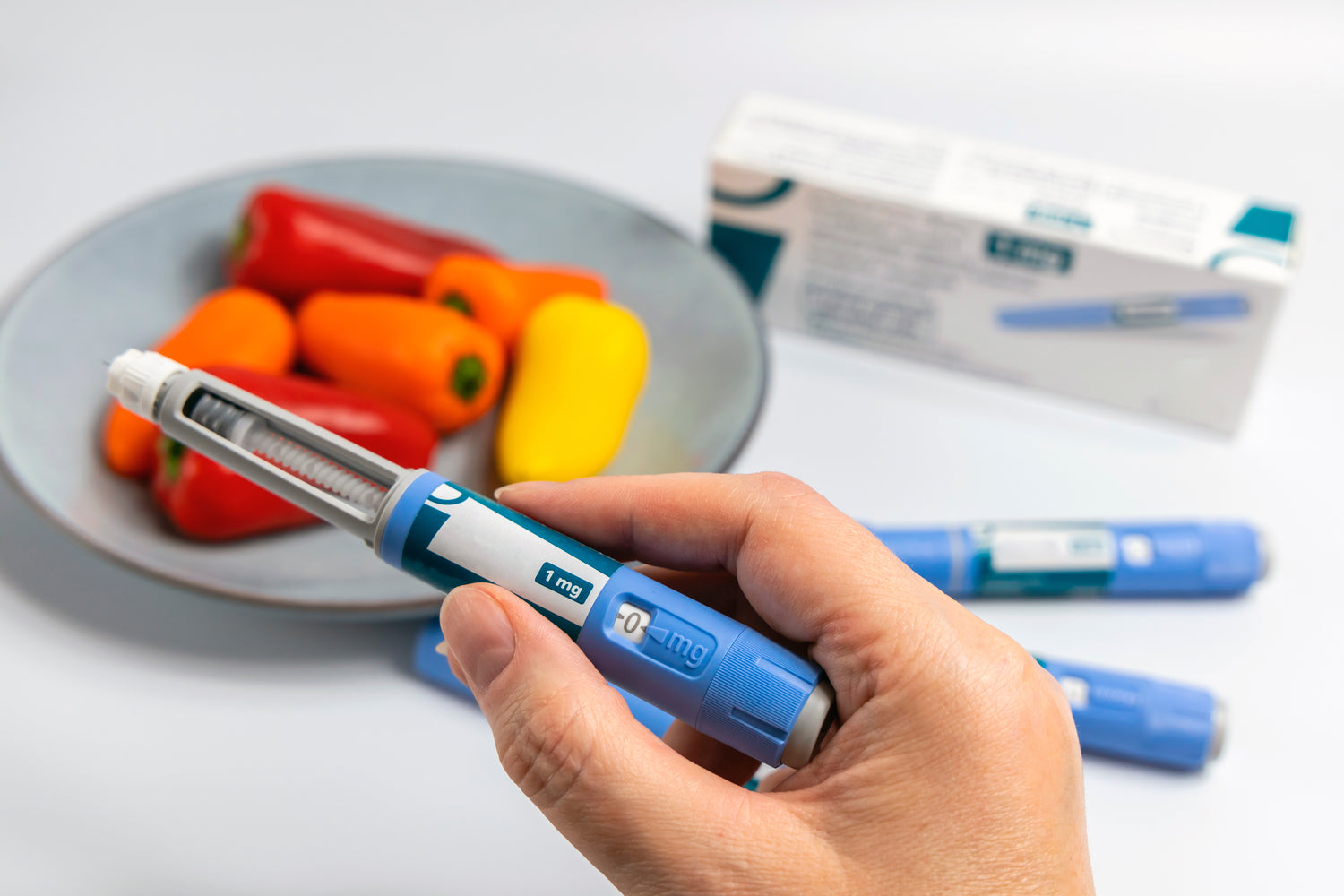
Ozempic/Wegovy
Ozempic and Wegovy are glucagon-like peptide-1 (GLP-1) agonists, a class of medications that mimic natural hormones to regulate appetite and metabolism. They work by slowing gastric emptying, increasing feelings of fullness, stabilizing blood sugar levels, and reducing cravings and overall appetite. Clinical studies show they can support up to 14% weight loss.
About
How does it work?
Semaglutide belongs to a class of medications called glucagon-like peptide-1 (GLP-1s) and is manufactured under two different brand names: Ozempic and Wegovy. Ozempic is indicated for the treatment of diabetes, while Wegovy is prescribed for weight loss management. Semaglutide helps you feel fuller, stabilizes blood sugar levels, and reduces cravings and appetite, making GLP-1s highly effective for weight loss. Semaglutide is administered as an injection, starting at a dose of 0.25 mg once weekly. Dosage instructions vary based on weight, tolerability, and other individual factors, and should be discussed with your healthcare provider.
Side Effects
Many people do not experience side effects from this medication. However, some common and potential side effects include:
- Nausea
- Vomiting
- Constipation
- Diarrhea
- Abdominal pain
- Gastroesophageal reflux disease
- Headache
- Reactions at the injection site
- Dizziness
- Altered taste
- Nasopharyngitis (common cold)
- Flatulence
- Bloating
- Decreased appetite
- Fatigue
These symptoms typically diminish as your body becomes accustomed to the medication. If side effects continue, please contact your healthcare provider.
Box Warning
Semaglutide is not suitable for individuals with a personal or family history of medullary thyroid carcinoma or those with multiple endocrine neoplasia syndrome type 2. It should also be avoided by anyone who has had thyroid cancer, suicidal ideation, a history of angioedema associated with GLP-1 agonists, gastroparesis, pancreatitis, or retinopathy. Individuals of childbearing potential should use effective birth control, as this medication may harm a fetus. Do not use Semaglutide if you are pregnant, attempting to conceive, or breastfeeding. Discontinue Semaglutide at least two months before planning pregnancy. Inform your doctor if you have kidney, liver, or pancreatic issues.

Zepbound / Mounjaro
Zepbound and Mounjaro mimic the effects of GLP-1 and GIP hormones, reducing appetite and increasing fullness. They have been shown to result in up to 20% weight loss with minimal side effects.
About
How does it work?
Tirzepatide is manufactured under two different brand names: Zepbound and Mounjaro. Mounjaro is indicated for the treatment of diabetes, while Zepbound is prescribed for weight loss management. Tirzepatide mimics the action of two hormones naturally released by the gut after food consumption: glucagon-like peptide-1 (GLP-1) and glucose-dependent insulinotropic polypeptide (GIP). Individuals who struggle to lose or maintain weight might have insufficient production of GLP-1 or GIP, or their brains may not adequately respond to these hormones. These hormones are crucial for creating a feeling of satiety by slowing digestion and play important roles in regulating blood sugar and controlling appetite.
Tirzepatide is administered as a weekly injection, starting at doses of 2.5 mg once weekly. The dosage usually increases every 4 weeks and may vary based on weight, tolerability, and other individual factors, as determined by your clinician.
Side Effects
Many people do not experience side effects from this medication. However, some common and potential side effects include:
- Nausea
- Vomiting
- Constipation
- Diarrhea
- Abdominal pain
- Gastroesophageal reflux disease
- Headache
- Reactions at the injection site
- Dizziness
- Altered taste
- Nasopharyngitis (common cold)
- Flatulence
- Bloating
- Decreased appetite
- Fatigue
These symptoms typically diminish as your body becomes accustomed to the medication. If side effects continue, please contact your healthcare provider.
Box Warning
Tirzepatide is not suitable for individuals with a personal or family history of medullary thyroid carcinoma or those with multiple endocrine neoplasia syndrome type 2. It should also be avoided by anyone who has had thyroid cancer, suicidal ideation, a history of angioedema associated with GLP-1 agonists, gastroparesis, pancreatitis, or retinopathy.
If you experience difficulty swallowing, hoarseness, neck lumps or swelling, or shortness of breath, contact your doctor immediately. In the event of a medical emergency, call 911 or go to the nearest emergency room.
Inform your healthcare provider of your medical history before starting Tirzepatide. Individuals of childbearing potential should use effective birth control, as this medication may harm a fetus. Do not use Tirzepatide if you are pregnant, attempting to conceive, or breastfeeding. Discontinue Tirzepatide at least two months before planning pregnancy. Inform your doctor if you have kidney, liver, or pancreatic issues.

Saxenda/Victoza
Saxenda and Victoza are older-generation GLP-1 medications administered daily, leading to 5-8% total body weight loss. They work by slowing stomach emptying and reducing appetite.
About
How does it work?
Liraglutide belongs to a class of medications called glucagon-like peptide-1 (GLP-1s) and is marketed under two different brand names: Victoza and Saxenda. Victoza is indicated for the treatment of diabetes, while Saxenda is prescribed for weight loss management. Liraglutide helps the pancreas release the proper amount of insulin when blood sugar levels are high, facilitating the movement of sugar from the blood to tissues where it’s used for energy. It may also slow the emptying of the stomach, which can decrease appetite. Liraglutide is administered as an injection, starting at a dose of 0.6 mg once daily. Dosage instructions vary based on weight, tolerability, and other individual factors and should be discussed with your healthcare provider.
Side Effects
Many people do not experience side effects from this medication. However, some common and potential side effects include:
- Nausea
- Vomiting
- Constipation
- Diarrhea
- Abdominal pain
- Gastroesophageal reflux disease
- Headache
- Reactions at the injection site
- Dizziness
- Altered taste
- Nasopharyngitis (common cold)
- Flatulence
- Bloating
- Decreased appetite
- Fatigue
These symptoms typically diminish as your body becomes accustomed to the medication. If side effects continue, please contact your healthcare provider.
Box Warning
Liraglutide is not suitable for individuals with a personal or family history of medullary thyroid carcinoma or those with multiple endocrine neoplasia syndrome type 2. It should also be avoided by anyone who has had thyroid cancer, suicidal ideation, a history of angioedema associated with GLP-1 agonists, gastroparesis, pancreatitis, or retinopathy. If you experience difficulty swallowing, hoarseness, neck lumps or swelling, or shortness of breath, contact your doctor immediately. In the event of a medical emergency, call 911 or go to the nearest emergency room.
Inform your healthcare provider of your medical history before starting Liraglutide. Individuals of childbearing potential should use effective birth control, as this medication may harm a fetus. Do not use Liraglutide if you are pregnant, attempting to conceive, or breastfeeding. Discontinue Liraglutide at least two months before planning pregnancy. Inform your doctor if you have kidney, liver, or pancreatic issues.

Rybelsus
Rybelsus is an oral medication that mimics the glucagon-like peptide-1 (GLP-1) hormone, which plays a key role in digestion and appetite regulation. Similar to the injectable Semaglutide (Ozempic), Rybelsus is taken daily in tablet form. It helps you feel fuller faster and reduces cravings and appetite.
About
How does it work?
Rybelsus belongs to a class of medications known as glucagon-like peptide-1 (GLP-1s), which help you feel fuller and stabilize blood sugar levels. These medications are effective in reducing cravings and appetite, making them highly effective for weight loss. Rybelsus is FDA-approved for the treatment of type 2 diabetes and is available in tablet form, starting at a dosage of 3 mg.
The tablets should be kept in their original bottle until they are ready to be taken and must be swallowed whole. Do not use a pill organizer or any other container to store Rybelsus tablets. Keep all tablets in the original bottle with the cap on, stored at room temperature in a dry place. Take the tablet with a sip of water (less than 4 ounces) 30 minutes before consuming food, drink, or other medication. Do not cut, crush, chew, or expose the tablets to air. Dosage instructions can vary based on weight, tolerability, and other individual factors, so be sure to discuss them with your healthcare provider.
Side Effects
Many people do not experience side effects from this medication. However, some common and potential side effects include:
- Nausea
- Vomiting
- Constipation
- Diarrhea
- Abdominal pain
- Gastroesophageal reflux disease
- Headache
- Reactions at the injection site
- Dizziness
- Altered taste
- Nasopharyngitis (common cold)
- Flatulence
- Bloating
- Decreased appetite
- Fatigue
These symptoms typically diminish as your body becomes accustomed to the medication. If side effects continue, please contact your healthcare provider
Box Warning
Rybelsus is not suitable for individuals with a personal or family history of medullary thyroid carcinoma or those with multiple endocrine neoplasia syndrome type 2. It should also be avoided by anyone who has had thyroid cancer, suicidal ideation, a history of angioedema associated with GLP-1 agonists, gastroparesis, pancreatitis, or retinopathy. If you experience difficulty swallowing, hoarseness, neck lumps or swelling, or shortness of breath, contact your doctor immediately. In the event of a medical emergency, call 911 or go to the nearest emergency room.
Inform your healthcare provider of your medical history before starting Rybelsus. Individuals of childbearing potential should use effective birth control, as this medication may harm a fetus. Do not use Rybelsus if you are pregnant, attempting to conceive, or breastfeeding. Discontinue Rybelsus at least two months before planning pregnancy. Inform your doctor if you have kidney, liver, or pancreatic issues.

Metformin
Metformin works by reducing glucose absorption in the intestines and improving insulin sensitivity. This helps decrease calorie intake and fat storage, ultimately leading to weight loss.
About
How does it work?
Metformin is FDA-approved to improve blood sugar control in adults with type 2 diabetes mellitus, in conjunction with diet and exercise. While its primary use is for diabetes, it is also frequently used off-label by obesity specialists and weight clinics to aid in weight loss. This off-label use involves regulating the body’s insulin response, decreasing cravings, reducing glucose production, and minimizing fat storage. Metformin is available in both tablet form and as an oral solution, typically starting at a dosage of 500 mg. Because dosage requirements can vary based on factors such as weight and tolerability, it is important to discuss the appropriate dosing with your healthcare provider.
Side Effects
- Diarrhea
- Nausea and vomiting
- Upset stomach
- Bloating
- Stomach cramps
Box Warning
Metformin-associated lactic acidosis can lead to severe complications, including death, hypothermia, hypotension, and resistant arrhythmias. Symptoms may include general discomfort, muscle pain, difficulty breathing, drowsiness, dizziness, changes in heart rate or rhythm, and abdominal pain. Risk factors for lactic acidosis include renal impairment, concurrent use of certain medications, age 65 or older, undergoing radiological studies with contrast, surgeries and other procedures, hypoxic conditions, excessive alcohol consumption, and liver impairment. Lactic acidosis is a critical medical emergency that requires immediate hospital treatment.

Naltrexone
Naltrexone aids in weight loss by targeting the brain's reward system, helping to reduce cravings and curb compulsive eating behaviors. It works by blocking opioid receptors in the brain, which play a role in the pleasure and reward aspects of eating.
About
How does it work?
Naltrexone is FDA-approved for treating alcohol and opioid dependence. Additionally, it is often used off-label by top obesity specialists and weight clinics to help with weight loss by reducing cravings and compulsive eating behaviors. Oral naltrexone typically comes in tablet form, starting at a dosage of 50 mg. Dosage instructions can vary based on weight, tolerability, and other individual factors, so be sure to discuss them with your healthcare provider.
Side Effects
Many people experience no side effects while taking Naltrexone. However, some of the more common side effects, though not highly frequent, include:
- Fatigue
- Insomnia
- Nervousness and anxiety
- Headache
- Nausea or vomiting
- Joint and muscle pain
- Stomach cramps or pain
Additional side effects can include:
- Loss of appetite
- Diarrhea or constipation
- Increased energy
- Increased thirst
- Dizziness
- Skin rash
Box Warning
Do not take Naltrexone if you are currently using any opioids or opiate drugs, are dependent on opioids, are using methadone or buprenorphine, or are experiencing opioid withdrawal. Taking opioids or opiates immediately after stopping Naltrexone can make you more sensitive to them, increasing the risk of overdose due to the need for lower doses. Please consult your healthcare provider before using any amount of opioids or opiates after discontinuing Naltrexone.

Bupropion
Bupropion supports weight loss by influencing brain chemistry to reduce cravings and compulsive eating behaviors. It works by increasing the levels of norepinephrine and dopamine, neurotransmitters that regulate mood, motivation, and reward pathways in the brain. This helps to curb the emotional drive to overeat, decrease hunger, and reduce the urge to engage in unhealthy eating habits
About
How does it work?
Bupropion is FDA-approved for treating depression, preventing depression in patients with seasonal affective disorder (SAD), and aiding in tobacco cessation. Additionally, it is frequently used off-label by leading obesity specialists and weight clinics to assist with weight loss by reducing cravings and compulsive eating. Bupropion typically comes in tablet form, with dosages starting at 75 mg. Dosage instructions can vary based on weight, tolerability, and other factors, so it is important to discuss them with your healthcare provider.
Side Effects
Common side effects associated with Bupropion include:
- Difficulty sleeping
- Headaches or migraines
- Nausea or vomiting
- Constipation
- Excessive sweating
- Dizziness
- Weight loss
- Decreased appetite
- Blurred vision
- Dry mouth
- Nervousness
- Agitation or other mental changes
- Tremors
- Rapid heart rate
Box Warning
Bupropion can potentially cause psychiatric side effects such as suicidal thoughts and behaviors, hallucinations, confusion, paranoia, irrational fears, and manic episodes, particularly in individuals with undiagnosed bipolar disorder. Additionally, this medication may lead to high blood pressure, rapid or irregular heartbeats, seizures, acute angle-closure glaucoma, and, in rare cases, death. It is important not to discontinue bupropion abruptly or without first consulting your healthcare provider.

Topiramate
Topiramate aids in weight loss by reducing appetite and cravings through its effects on the brain's reward systems. It works by reducing he rewarding aspects of food, making it less likely to overeat or indulge in cravings. By addressing both physiological and neurological factors, Topiramate effectively helps control appetite, leading to sustained weight loss.
About
How does it work?
Topiramate is FDA-approved for treating seizures and preventing migraines, but it is also frequently used off-label by leading obesity specialists and weight clinics to assist with weight loss by reducing appetite and cravings. It comes in several forms, including tablets and extended-release capsules (25 mg, 50 mg, 100 mg, and 200 mg). Dosage instructions vary based on weight, tolerability, and other factors, so it is essential to discuss them with your healthcare provider.
Side Effects
Common side effects of topiramate include:
- Weight loss
- Anorexia
- Dizziness
- Fatigue or drowsiness
- Difficulty with concentration and psychomotor slowing
- Speech difficulties
- Nervousness
- Tingling or prickling sensations
- Abnormal vision
- Fever
Box Warning
Before using topiramate, inform your healthcare provider about your medical history, especially if you have:
- Narrow angle glaucoma or nearsightedness
- Kidney problems, such as kidney stones
- Liver problems
- Depression or thoughts of suicide
- Lung or breathing problems
- Metabolic acidosis
- High blood ammonia levels
- Long-term diarrhea
- Low body temperature
- A diet high in fat and low in carbohydrates, such as a ketogenic diet
- Brittle bones
Topiramate may cause some people to sweat less, so it is recommended to avoid alcohol and stay well-hydrated while taking this medication. This drug can make you dizzy or drowsy and may impair your judgment. Do not drive, operate heavy machinery, or perform any hazardous tasks until you know how topiramate affects you. If you are taking diabetes medications, discuss this with your prescribing clinician before starting topiramate, as your diabetes medications may need adjustment as you lose weight.
Topiramate may also cause birth defects, particularly a risk of cleft lip and/or palate and low birth weight. It may cause breakthrough bleeding. Do not take topiramate if you are planning to become pregnant, are pregnant, or are breastfeeding.
For best results, include:
-
Genetic Test for Weight Loss and Metabolism
Regular price $395.00 USDRegular priceUnit price per -
Healthy Cooking Book
Regular price $25.00 USDRegular priceUnit price per -
Slim for Life: Mastering Weight Loss and Nutrition - 12 weeks course
Regular price $860.00 USDRegular priceUnit price per -
 Sold out
Sold outBiomarker Test
Regular price $135.00 USDRegular priceUnit price per





